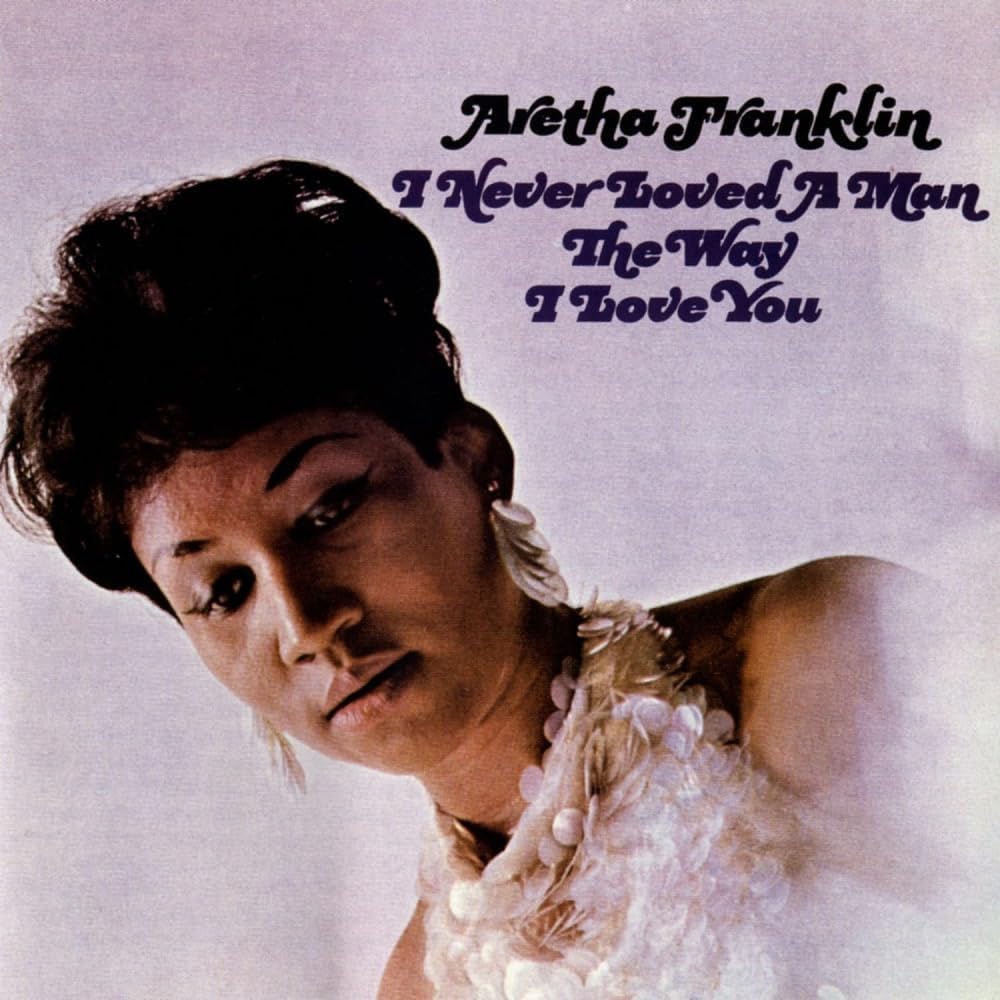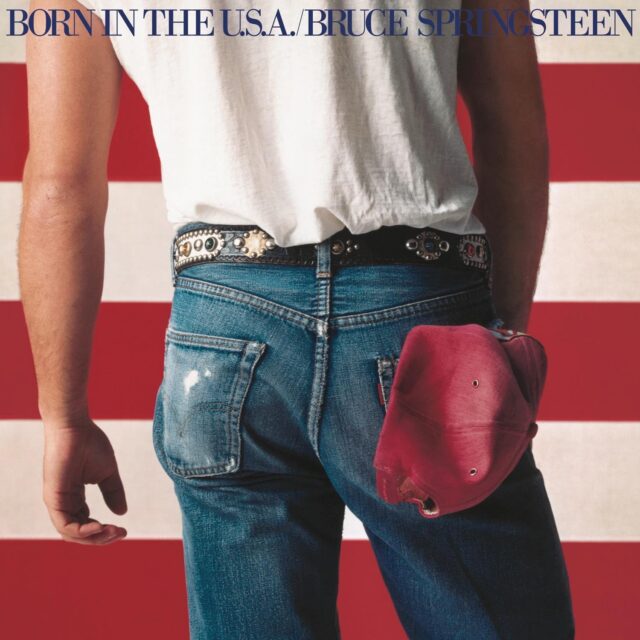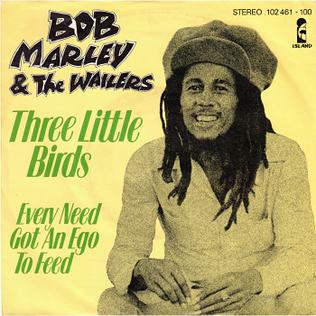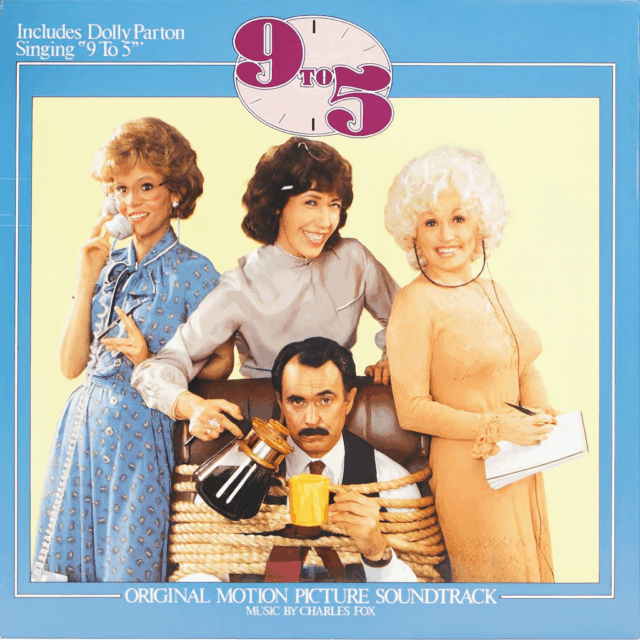In mid-1965, Otis Redding, known as the “King of Soul,” wrote a song about a man’s complaint to his woman about needing respect when he comes home. He wants it. He needs it. He has to have it. It must be given to him. This song is called “Respect.”
By the time Redding’s “Respect” was released on August 15, 1965, Aretha Franklin had recorded seven albums with Columbia Records with minimal success. She performed in supper clubs and small jazz venues, primarily touring cities like Detroit, Baltimore, Washington, D.C., Chicago, Cleveland, Boston, and Philadelphia.
Living in Detroit at the time, Franklin remembered hearing “Respect” for the first time, stating, “I had just moved out of my father’s home and had my own little apartment. I was cleaning the place, and I had a good radio station on. I loved it. I loved it! I felt I could do something different with it.”
By 1966, Franklin’s Columbia contract was ending, and the relationship was falling apart. Columbia had lost $90,000 on her music and offered a deal, but she refused. After years of being mismarketed as a pop and jazz singer, the frustrated Franklin added Redding’s “Respect” to her club performances.
“I remember she sang ‘Respect,'” recalled Louise Bishop, a gospel music radio personality at Philadelphia’s WDAS Radio during the 1960s. “And I just could not believe that anybody could sing that song better than Otis Redding.”
In late 1966, Bishop went to see Franklin at the Cadillac Club in Philadelphia. At the time, Franklin’s contract with Columbia had expired. Bishop stated, “It was a very tiny club, probably seated two hundred fifty people. Her singing was so close to church singing that I was just in love with her. The last night she was there, I said, ‘Aretha, what are you going to do with yourself? You don’t have a contract anymore!’ She said, ‘I’m going to record myself. I’m just as good a singer as Barbra Streisand, and I’ve not had the push behind me that she has. I can sing anything she can sing—and better.’ So I said, ‘Aretha, you’re much too big a singer to record yourself. You’re an artist! I know somebody. Why don’t you let me introduce you?'”
Bishop was thinking of Jerry Wexler from Atlantic Records. “I used to call Jerry Mr. Atlantic,” Bishop stated. “I absolutely thought he was the greatest soul producer there was. I knew that Jerry’s talent was exactly what Aretha needed, so making the marriage, performing the ceremony between Jerry and Aretha, was a natural.”
Once Franklin agreed, Bishop made the introduction, stating, “Aretha’s ready for you… Aretha, Jerry – Jerry, Aretha.”
On November 21, 1966, in New York City, Aretha Franklin signed with Atlantic Records, where she was encouraged to “drop the Judy Garland Cabaret Act.” “My idea was to make good tracks, use the best players, put Aretha back on piano, and let the lady wail,” said Wexler.
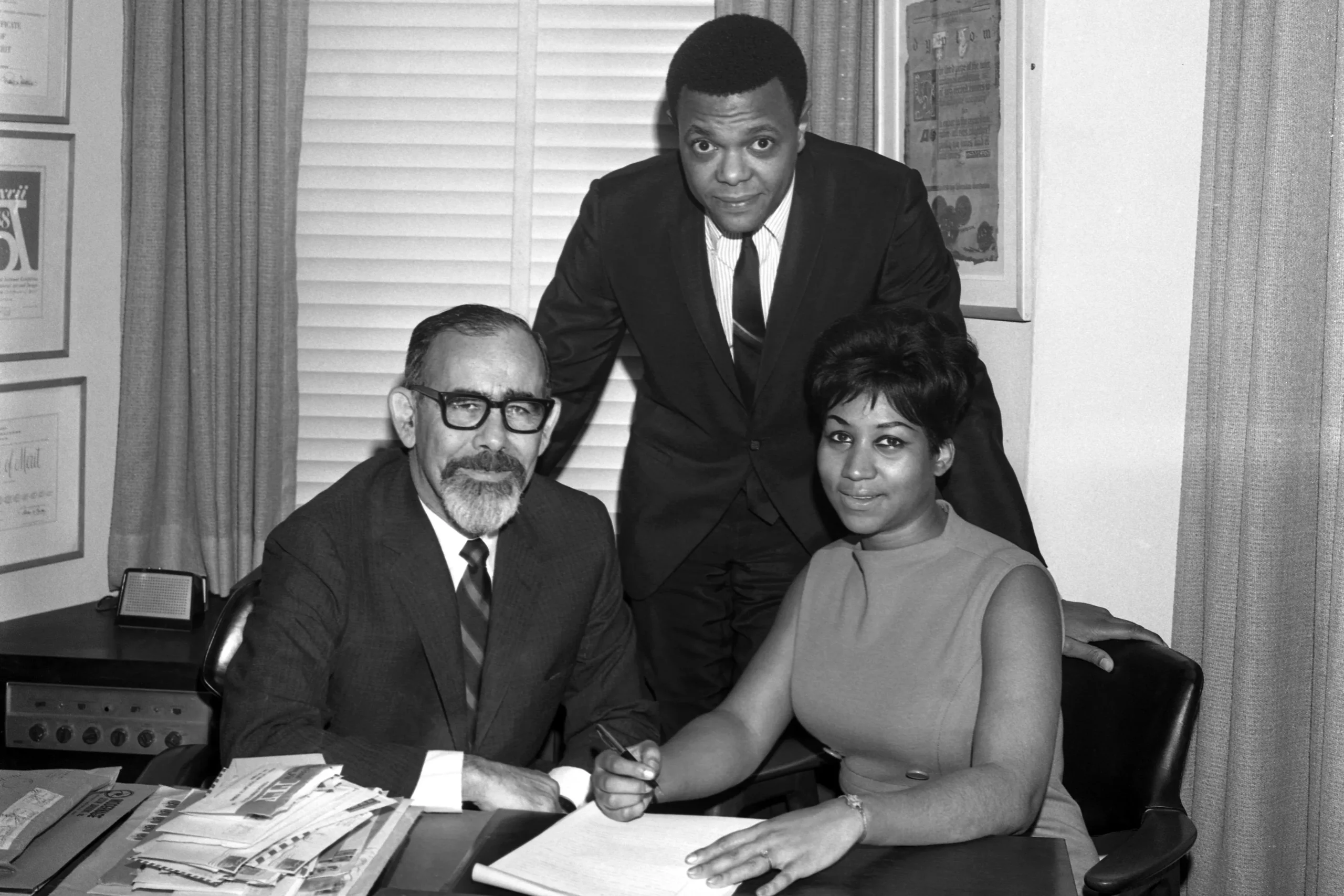
Wexler sent Franklin to FAME Studios in Muscle Shoals, Alabama, where on January 24, 1967, she recorded “I Never Loved a Man (The Way I Love You)” and began recording “Do Right Woman, Do Right Man” with the Muscle Shoals Rhythm Section.
FAME founder Rick Hall stated, “At around ten o’clock that morning, Aretha walked into the studio, then casually walked over to the baby-grand piano that sat in a corner of the studio in front of the large control room glass window, and sat down to do what she came to FAME to do – to cut a hit record.”
While “I Never Loved a Man (The Way I Love You)” was fully recorded, the session was cut short due to an altercation between Ted White, Franklin’s husband and manager, Hall and the band members. Hall told White “he’d better get out of town.” Franklin and White left the next day.
With recording on pause, Wexler and Atlantic Records devised a plan for Franklin to return to the studio without White and fly the Muscle Shoals Rhythm Section to New York to record at Atlantic Studios and complete the album.
By this time, Franklin had been reworking “Respect” and developing her version of Redding’s song.
“I Never Loved a Man (The Way I Love You)” was released on February 10, 1967, and shot to number one on the R&B chart and number nine on the Billboard Hot 100. The momentum for Franklin started.
On February 14, 1967, Franklin was in New York to record the rest of the album, including “Respect.”
Lyrically: Respect by Aretha Franklin
“Aretha wrote most of her material or selected the songs herself, working out the arrangements at home and using her piano to provide the texture. In this case, she just had the idea that she wanted to embellish Otis Redding’s song. When she walked into the studio, it was already worked out in her head,” said Wexler.
There would be no Aretha Franklin “Respect” without Otis Redding’s “Respect.”
Whatever caused Franklin to advance the lyrics of “Respect” is respectful in itself. At the time, in 1967, whether it be her lackluster career with Columbia Records, her relationship with husband and manager Ted White, or the cultural climate of the United States with the civil rights movement and the emerging women’s liberation, Franklin decided “Respect” was for everyone and everywhere.
“It [reflected] the need of a nation, the need of the average man and woman in the street, the businessman, the mother, the fireman, the teacher—everyone wanted respect. It was also one of the battle cries of the civil rights movement. The song took on monumental significance,” said Franklin.
Understanding that Otis Redding’s “Respect” tells the story of a man wanting respect when he comes home, Franklin’s version expands this scene by genuinely demanding respect first for herself, then for others, ultimately owning the moment and direction of the conversation. This became an anthem for millions to live by.
Hey, what you want(oo) Baby, I got(oo) What you need(oo) Do you know I got it?(oo) All I’m askin’(oo) Is for a little respect when you come home (just a little bit)Hey baby (just a little bit) when you get home(Just a little bit) mister (just a little bit)
The shift in conversation is quick. In Redding’s version, he sings in the second verse, “All I’m asking / Is for a little respect when I come home.” Franklin takes the same line but transforms it by changing one crucial word, singing conversationally, “All I’m askin’ / Is for a little respect when you come home (just a little bit).”
Respect is mutual. She also wants to be respected, even just a little bit. The message was clear, and Franklin gave a voice to anyone who wanted to be heard.
“The call for respect went from a request to a demand,” Wexler wrote. “And then, given the civil rights and feminist fervor that was building in the 1960s, respect — especially as Aretha articulated it with such force — took on new meaning. ‘Respect’ started off as a soul song and wound up a kind of national anthem.”
I’m about to give you all of my moneyAnd all I’m askin’ in return, honeyIs to give me my profits
These lyrics suggest being financially independent rather than financially dependent on another, which is in contrast to the direction of Redding’s original version of “Respect.” Franklin’s lyrics suggest that “I’m investing everything in you, and all I want back is to be treated fairly and valued for what I give.”
Franklin’s lyrics present a person who is faithful, financially independent, and unafraid to make commands and demands, as evident with “Whip it to me (respect, just a little bit).”
With the famous ‘R-E-S-P-E-C-T’ hook, Franklin made her message an anthem. She literally spelled out the word as a direct cue for anyone who needed to learn what respect means, something people could chant and rally around.
Following this was “take care, TCB,” which Franklin stated means “taking care of business,” emphasizing the need to actively demonstrate respect through actions.
“My sister Carolyn and I got together and was living in a small apartment on the west side of Detroit – piano by the window, watching the cars go by, and we came up with that infamous line,” said Franklin. “It was a cliche of the day. And some of the girls were saying that to the fellows – like, sock it to me in this way or sock it to me that way. It’s not sexual. It was non-sexual, just a cliche line… It’s like if you gave me a high five.”
The final verse, stripped of the background vocals, reveals what could happen if the desired respect is not reciprocated. Franklin notes that she’ll leave. “Whoa, babe / A little respect / I get tired / Keep on tryin’ / You’re runnin’ out of foolin’ / And I ain’t lyin’ / ‘spect / When you come home / Or you might walk in / And find out I’m gone / I got to have / A little respect.”
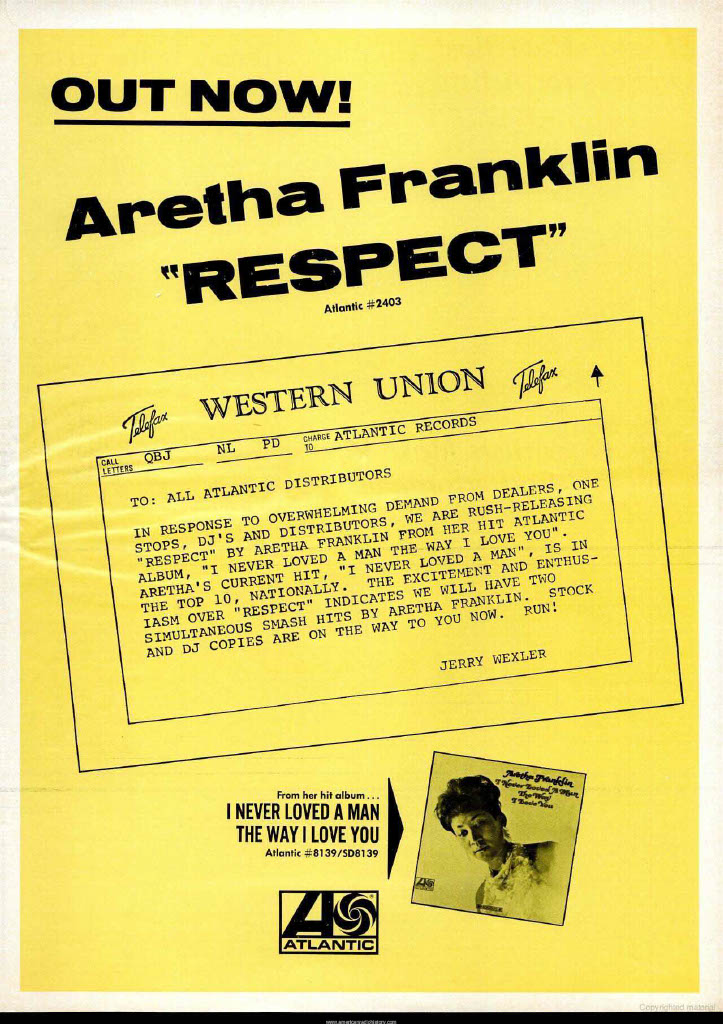
“I was stunned when it went to number one,” Franklin recalled, “and it stayed number one for a couple weeks. It was the right song at the right time.”
Aretha Franklin’s “Respect” was released as a single on April 10, 1967 and reach No. 1 on the Billboard Hot 100 on June 3, 1967, where it remained for two weeks. “Respect” also held the top spot on the Billboard R&B chart for eight weeks.
While “Respect” was dominating the charts and the hearts of listeners, in May of 1967, WVON radio personality Pervis Spann introduced Franklin at Chicago’s Regal Theater as “the Queen of Soul” and placed a crown on her head.
“That happened when I was at the Regal Theater in Chicago, which was very much like The Apollo in New York. One of the local DJs there, a guy named Pervis Spann, he walked on stage one evening with a crown, and I went, ‘Whoooa! What is this?’,” said Franklin. “Who wouldn’t want to be called ‘Queen’!”
“Respect” became an anthem for change and transformed Aretha Franklin from a struggling Columbia Records artist into a global icon. In 1968, “Respect” won two Grammy Awards: Best Rhythm & Blues Recording and Best Rhythm & Blues Solo Vocal Performance, Female. Franklin would go on to become the first woman inducted into the Rock & Roll Hall of Fame and top Rolling Stone’s list of the Greatest Singers of All Time.
When the “King of Soul” Otis Redding first heard Franklin’s version of “Respect,” he said, “It’s her song now” and jokingly asked Jerry Wexler to burn the tape. Then, on June 17, 1967, during a performance at the Monterey Pop Festival, Redding told to the audience, “This is a song that a girl took away from me, a good friend of mine. This girl she just took this song, but I’m still going to do it anyway.” He performed a variation that blended his version of with Franklin’s.
On December 9, 1967, in what would be Redding’s final performance before his death the next day, he sang “Respect” with Franklin’s signature hook of “R-E-S-P-E-C-T / Take care, TCB.”
On December 9, 1967, in what would be Redding’s final performance before his death the next day, he sang “Respect” with Franklin’s signature hook of “R-E-S-P-E-C-T / Take care, TCB.”
“Respect” by Franklin became everyone’s song.

